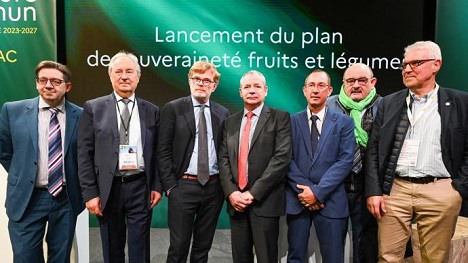The National Association of Apples and Pears asks for a safeguard plan for the French apple, with measures based on three pillars, for the coming 24 months.

During his visit to the Salon de l'Agriculture, Minister Marc Fesneau announced the launch of a 200 million euro sovereignty plan for the fruit and vegetable sector / © Xavier Remongin/agriculture.gouv.fr
"The fruit and vegetable sovereignty plan that was announced this morning by the Minister of Agriculture Marc Fesneau does not address the immediate difficulties faced by apple and pear producers. Without questioning the objectives of this unambitious plan, the National Association of Apples and Pears (ANPP) reiterates the current distress of fruit growers. The 2030 deadline given in the plan is far too distant, whereas the next two years will be decisive for the survival of French orchards. The sovereignty of the country in apples and pears can only be achieved with agronomically secured and economically viable orchards as soon as possible. The ANPP urgently calls for a 24-month safeguard plan based on three pillars
1. To ensure the economic viability of the companies of the sector
According to ANPP's observations, production costs have increased by more than 20% between 2021 and 2022. These costs continue to increase even though the state's energy subsidy schemes have not helped the situation. From orchards to stations, the ability of producers to finance their crop inputs for the next season is compromised for many companies.
The State must guarantee the funding of the crop loan for the next campaign with the banks by reactivating for 2 years a system of loans guaranteed by the State. The deadline for crop loans is currently limited to a few weeks.
This is an urgent matter as fruit growers are still short of €0.20/kg to make a living from their work.
2. Ensuring access to the means of production
To regain competitiveness, the State must ensure that French arboriculturists will have access to the same means of production as European producers, in terms of phytopharmaceutical solutions, water, and manpower. Today, it is impossible to finance a rise in quality and thus the French market is wide open to imported products. Adaptation to climate change requires the immediate mobilization of sufficient means of irrigation and anti-frost protection by sprinkling.
The ANPP approves the immediate stop of all French over-transposition announced by the Prime Minister and supported by the Renaissance group's resolution proposal. Arboriculturists will remain vigilant about its application.
For emergencies, the ANPP requests to have access to the same phytopharmaceutical solutions as other European producers.
The ANPP requests that, by regulation, the State increase for the next two years the threshold of authorization required for the creation of water reservoirs for irrigation and that a plan for the creation of reservoirs be enacted at the level of each department with simplified and accelerated procedures regarding their application.
3. Providing fair information to French consumers
French policies of over-transposition in the area of plant protection products lead to a situation of major competitive distortion in the areas of productivity and adaptation to climate change. Therefore, it is fair to ask the question of whether imported foodstuffs produced without the same requirements should be allowed to enter the French market without informing the consumer.
The ANPP asks that the mention of the origin of apples be made compulsory on all fresh products, regardless of the distribution network (catering in particular) or as part of the composition of processed products.
We ask that for all fresh, preserved, or processed apples coming from countries where phytosanitary solutions forbidden in France are authorized, the labeling should mention "This product is from (name of the country), a country where phytosanitary products forbidden in France are used."
For more information:
Association Nationale Pommes Poires
www.lapomme.org
www.vergers-ecoresponsables.fr
